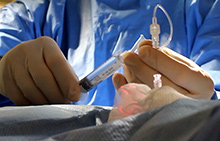
It is immensely gratifying to be a neurosurgeon, but also very humbling. Having the ability to heal is awesome in the most literal sense of that word – the ability to use our hands to restore someone to health is a great gift, which we have learned never to take for granted.
But we are also neuroscientists, always searching for new solutions and innovations. Technology changes every day, and we strive to stay at the forefront of these developments. In just the past few years we’ve seen the introduction of some amazing new tools – focused ultrasound, ever-smaller endoscopes, drugs that open the blood-brain barrier and devices that bypass it. These are all innovative ways to deliver therapies to the brain in new, less invasive ways.
The neurosurgeons at Weill Cornell Medicine are developing many new ways to approach a wide variety of brain diseases, and frequently collaborate with specialists in many disciplines to use our skills and our understanding of the brain to advance their fields as well as ours. Some of our most gratifying projects are those that use neurosurgery in novel and exciting ways to find the potential cures of the future.
One recent example is a clinical trial conducted by our colleague Ronald Crystal in the department of genetic medicine here at Weill Cornell Medicine. Dr. Crystal has been investigating a genetic condition called Batten disease, a devastating degenerative disorder of the central nervous caused by mutations in the CLN2 gene. This disorder typically declares itself in children between the ages of 2 and 4 and progresses over the course of about 10 years – with cognitive and motor decline, blindness, and seizures – until the inevitable death of the child before age 12. The clinical description of the disorder is dismal enough; the cost to families is unimaginable.

Above: Dr. Souweidane performs a gene therapy infusion on a young patient with Batten disease. Below and detail at top: Dr. Kaplitt delivering gene therapy to a patient with Parkinson's disease

This clinical trial was designed to investigate the possibility that gene therapy might slow the course of the disease. Gene therapy holds tremendous promise for a wide variety of disorders, but among its challenges is getting modified genetic material into the nucleus of a target cell. Imagine the challenges when those targeted cells are in the brain. Fortunately, we neurosurgeons have the ability to do what the geneticists needed: We could deliver a virus vector expressing a normal CLN2 coding sequence directly into the brains of children with this terrible condition.
Delivering anything to the brain is no small feat. The brain has evolved to keep dangerous intruders like viruses and bacteria – and surgeons – out, and its design serves it well. To deliver adequate doses of the vector to the brain required us to drill three burr holes on each side of each child’s skull, then use a catheter to infuse the vector into two adjacent sites at each of the six burr holes. It is a delicate, intricate process, and we never forget, ever, that the surgical site in front of us is not a science project. It’s someone’s much-loved child, representing a family that has put its hope in our surgical skills and scientific acumen.
The results of that trial (“Slowing late infantile Batten disease by direct brain parenchymal administration of a rh.10 adeno-associated virus expressing CLN2”) were published last month in the journal Science Translational Medicine. It was certainly gratifying to see that the gene therapy infusions did help slow the progression of the disease, but that’s not enough. No one is satisfied with increases in short-term survival rates in children – we need to halt progression, not just slow it down. And so we continue searching, testing, and using our skills as neurosurgeons to defeat a problem in genetics.
We are doing the same thing in other areas that are not generally thought of as surgical. We have pioneered both gene therapy and non-invasive focused ultrasound trials for Alzheimer’s and Parkinson’s diseases, as well as direct delivery of chemotherapy drugs, that normally do not enter the brain, in order to address untreatable brain tumors. Whether we are bringing the latest surgical therapies to our patients or developing treatments of the future, our goal is always the same – to do whatever we can to use our skills and knowledge to help find new treatments, cure patients, and save lives.
See a full list of clinical trials offered at Weill Cornell Medicine